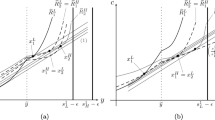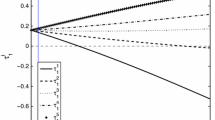Abstract.
I argue the compatibility of progress with Rawls's maximin principle when applied to individual utility functions which are “nonaltruistic” in the sense that any transfer of consumption goods from old to young (resp. from young to old) lowers (resp. increases) old people's utility. The paper shows that necessary conditions for that compatibility are: (A) a bound on the feasible transfers from young to old, and (B) a positive intergenerational stock externality. The analysis implies that the maximin principle has the drawback of making, under mild assumptions, conservation incompatible with progress.
Similar content being viewed by others
Author information
Authors and Affiliations
Additional information
Received: 15 December 1999/Accepted: 17 April 2000
Rights and permissions
About this article
Cite this article
Silvestre, J. Progress and conservation under Rawls's maximin principle. Soc Choice Welfare 19, 1–27 (2002). https://doi.org/10.1007/s355-002-8323-z
Issue Date:
DOI: https://doi.org/10.1007/s355-002-8323-z




